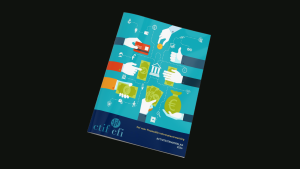Get ready for Sibos 2023 with hot tips from Discai’s CEO, Fabrice Deprez
Sibos is the biggest annual event for financial institutions (FIs). Every year, Swift—one of the world’s leading suppliers of secure financial messaging services—brings together thousands of movers and shakers in the financial world to discuss the big questions and shape the future of the sector. From 18–21 September, these business executives, decision makers and thought leaders will gather in Toronto for an action-packed, four-day conference. Discai will be there of course, sharing a booth with our parent company, leading European bank KBC.

Sibos is the biggest annual event for financial institutions (FIs). Every year, Swift—one of the world’s leading suppliers of secure financial messaging services—brings together thousands of movers and shakers in the financial world to discuss the big questions and shape the future of the sector. From 18–21 September, these business executives, decision makers and thought leaders will gather in Toronto for an action-packed, four-day conference. Discai will be there of course, sharing a booth with our parent company, leading European bank KBC.
The Sibos theme for 2023 is ‘Collaborative finance in a fragmented world’. With more than 250 sessions covering topics such as cross-border payments, post-trade data, financial crime prevention, digital currencies, financial inclusion, artificial intelligence (AI), machine learning, ESG standardisation and sustainability, this year’s conference is sure to be as enlightening and inspirational as ever.
With so many sessions to choose from, you might be wondering which ones to attend. Don’t worry, I’ve got you covered. This year, I believe the most pressing topic to learn more about is financial crime prevention. Why? Because in this increasingly digitised world, financial crime is booming. Modern criminals are using AI to target FIs, so FIs need tools that utilise AI and machine learning to fight back. And there’s no time to waste—these crimes are already happening every day. On the other hand, we need to remain careful with this type of technology. It has also its risks. The right balance is crucial.
Below, you’ll discover six presentations at Sibos that you definitely won’t want to miss, and why. And on Thursday 21 September, you can even catch me discussing the technical and ethical intricacies of using AI to fight financial crime at Responsible AI: Working together to get it right.

Beyond the buzzwords: Understanding the reality of AI’s reach
Monday 18 September, 9:30 (GMT-4)
What’s it about?
When ChatGPT was unleashed on the world at the end of 2022, AI became a top priority for organisations everywhere. However, the ongoing effects of this are not yet clear. This session brings together a panel of experts to share their views on the impact of AI across multiple sectors, including financial services, and how things might play out in the future.
Why should you attend?
AI is a real buzzword. Well, actually, it’s two words—artificial intelligence—but you get the idea. Lately, it seems like AI is everywhere and being used in every sector. There are many types of AI, from basic models that operate in contained environments to self-learning, evolving technologies.
AI brings huge potential for us to achieve things we couldn’t do with human power alone. However, we need to tread carefully. We can’t give all our power away; ensuring humans always have the final say is a necessity, even as AI is trained to lighten our workloads by taking over certain burdens. There will be a line we should not cross! But where exactly is that line?
Contrarian views: AI is the future … or not?
Monday 18 September, 14:45 (GMT-4)

What’s it about?
AI has made a lot of advances in recent years, but there are still limits to what it can do. It can perform specific tasks with pinpoint accuracy, but it’s not yet capable of general intelligence or understanding complex human emotions. It can analyse it and replicate it, but not understand it. There are also ethical concerns and potential risks associated with developing AI. So, is it possible some other ground-breaking technology, like biotechnology, nanotechnology or quantum computing, will eventually send AI into obsolescence or even boost it to a dangerous level.
Why should you attend?
I don’t think there’s really any doubt that AI will be a part of our future. But to what extent? Will the negative effects outweigh the positive? Or the other way round? Will it take over human roles to the point that we become obsolete? Or will it become an extension of our capabilities, enabling us to reach further than we ever could without it? In this session, experts will explore how we might develop AI to meet future goals, the associated risks of doing so, and whether those risks are worth taking.
Personally, I don’t believe people will be entirely replaced by AI. And let’s not forget: AI also presents new opportunities. For example, it might help some companies bring jobs back to their home countries. Right now, millions of jobs are outsourced to countries where labour and overheads are cheaper. AI has the potential to bring a lot of this work back home through automation. By using robotics to automate manual processing work, it’s possible to reduce costs and keep production local. One thing is crystal clear: nobody knows how this whole thing is going to play out—which is exactly why we need to talk about it!

Big Issue Debate: What is the impact of technology and data intelligence on financial services?
Monday 18 September, 15:30 (GMT-4)
What’s it about?
In the past 12 months, we’ve seen astronomical developments in the field of data technology. Applied machine learning, generative AI, new forms of data sharing, and the development of new foundation models have empowered financial institutions to make data-driven decisions that mitigate risks and improve the experiences of their customers. But how are these developments affecting the financial community and society at large?
Why should you attend?
We’re a long way from the days when keeping your money in the bank meant storing it in a vault. Nowadays, protecting people’s wealth is all about data. And boy do we collect a lot of data. But are we managing it in the best ways possible? And are we acting in the best interests of our customers? At the end of the day, as financial service providers, we need to ensure our customers are benefiting from our services as much as possible. And that means making sure we’re not only choosing the best technologies, but also optimising how they’re used.
Widening the lens: Industry collaboration in the fight against financial crime
Tuesday 10 September, 3:30 (GMT-4)

What’s it about?
For most FIs, fighting financial crime is an internal job. It’s viewed through the single lens of the individual FI, drawing only on the data and analytics available within that FI. But what would happen if FIs started working together instead? A collaborative approach could be exactly what we need to stop criminals in their tracks and deliver better outcomes for customers. But how might such a collaboration work?
Why should you attend?
There are many types of financial crime, including crimes towards individuals (e.g. phishing), crimes towards FIs (e.g. insurance fraud), and crimes towards governments (e.g. money laundering). With technology developing at such a fast pace, it simply doesn’t make sense for FIs to fight these crimes alone. However, we can’t just start sharing sensitive data and insights between businesses—what about data privacy? We need to find ways to work together without compromising data privacy and professional integrity, which is precisely why discussions such as this are so important.

Payments data: The ultimate weapon against financial crime?
Thursday 21 September, 9:30 (GMT-4)
What’s it about?
What are the most effective ways of understanding financial crime threats at a national and international level? A recent paper written by the security think tank Royal United Services Institute and supported by the Swift Institute explored ways in which we might better analyse payments data to keep FIs, governments and end customers safe. This session will unpack the results of this paper, along with the importance of the G20’s building blocks for enhancing cross-border payments, and the implementation of ISO 20022.
Why should you attend?
All criminality leads to the laundering of money. It’s the only way for criminals to turn their illegally obtained profits into useable currency. Most laundering happens through money movements. With payments being one of the main methods criminals use to launder money, payments data is some of the most valuable data there is in the fight against financial crime—a fight we are all in together. So, let’s join forces. Eradicating criminality completely is a fairly lofty goal, but together, we’re certain to make more progress than we can alone.
Responsible AI: Working together to get it right
Thursday 21 September, 4:00 (GMT-4)

What’s it about?
FIs need to work together to stop financial crime. And the rapid development and deployment of AI technologies is enabling the collection of more and more data that will help in this fight. But how can FIs navigate the use of privacy-enhancing technologies to solve common challenges? There are a lot of angles to consider. In this debate-style session, I will join a panel of industry experts—technology providers, financial service providers, and regulators—to discuss how we can work responsibly with AI to strengthen existing governance frameworks and achieve the best results for our customers.
Why should you attend?
AI is not intrinsically good nor bad, but it is incredibly powerful. And that power can be used in both positive and negative ways. To make sure we’re being responsible with this power, we need to examine the use of AI from two important angles: why and how it is used. We must not use it frivolously, but only for necessary purposes. And preventing money laundering is certainly a worthy cause. It’s a crime that takes huge sums of money out of governments’ pockets—money that could be used to improve the lives of everyone living under that government.
In terms of how AI is used, the number-one consideration is transparency—exactly how and why AI has reached certain conclusions or taken specific actions must always be clear. Discai’s AI-based KYT AML solution, for example, is not a black box, meaning it can’t be viewed solely in terms of input and output without an understanding of how it works. It analyses transactions using a scoring system; a high score means a high probability that the transaction is connected to money laundering. And it gives an explanation about why the AI has reached a particular conclusion. This means the AML investigator has all the information they need to independently assess the validity of the conclusions. There are some things it simply isn’t appropriate for AI to take over. That’s why it’s crucial to ensure the ultimate decision always lies with a real person.

See you at Sibos!
Don’t forget to drop by Discai’s booth—we’d love to say hi and introduce you to our cutting-edge anti-financial crime solutions. And remember, I’ll be speaking at Responsible AI: Working together to get it right on Thursday 21 September at 4:00 (GMT-4). I’m excited to have this amazing opportunity to share crucial information on a topic that’s important not only to me, but to the entire financial sector and all the customers relying on it. I hope to see you there!
Don’t want to miss out on the latest AI and financial crime insights?
Join us at the finance world’s biggest annual event.










